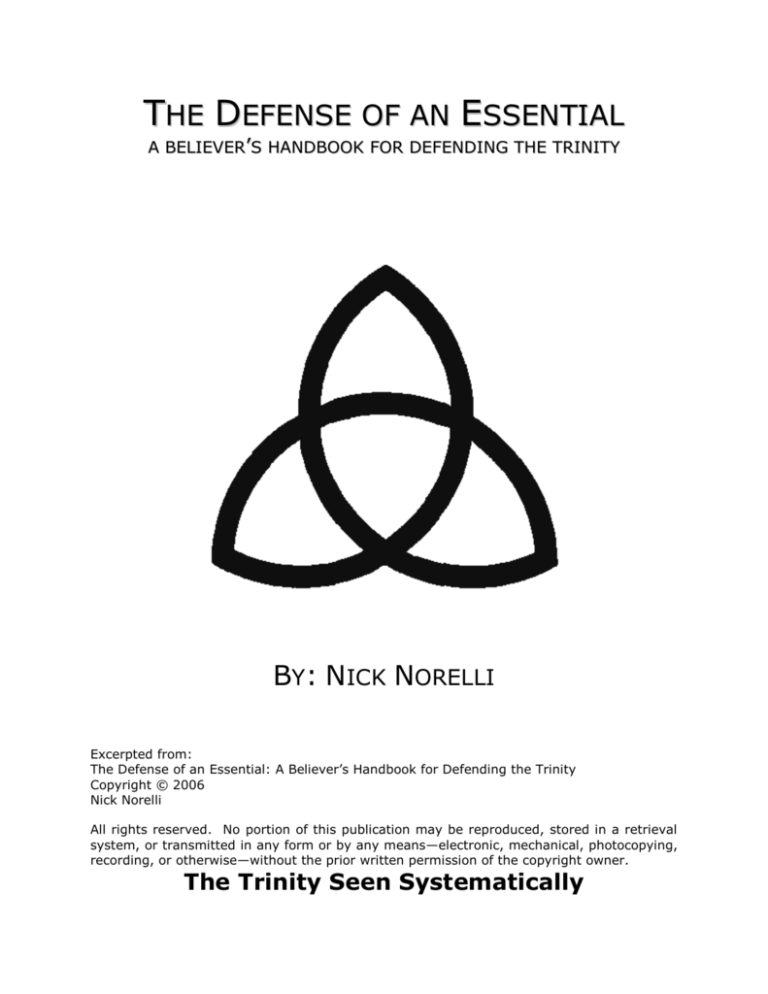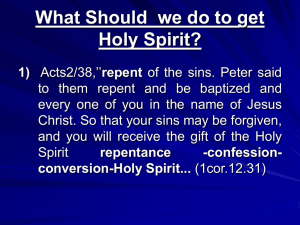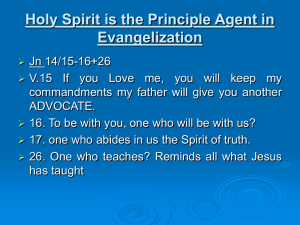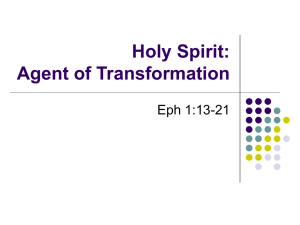
THE DEFENSE OF AN ESSENTIAL
A BELIEVER’S HANDBOOK FOR DEFENDING THE TRINITY
BY: NICK NORELLI
Excerpted from:
The Defense of an Essential: A Believer’s Handbook for Defending the Trinity
Copyright © 2006
Nick Norelli
All rights reserved. No portion of this publication may be reproduced, stored in a retrieval
system, or transmitted in any form or by any means—electronic, mechanical, photocopying,
recording, or otherwise—without the prior written permission of the copyright owner.
The Trinity Seen Systematically
By: Nick Norelli
Interpretive Method
The Doctrine of the Trinity is primarily a Biblical doctrine which can be arrived at
systematically by comparing scripture with scripture. This is precisely the principle of
interpretation that the Lord laid out for us as spoken through the Prophet Isaiah.
“Whom shall he teach knowledge? and whom shall he make to understand
doctrine? them that are weaned from the milk, and drawn from the breasts.
For precept must be upon precept, precept upon precept; line upon line, line
upon line; here a little, and there a little.” (Is. 28:9-10)
Doctrine is understood by laying line upon line and precept upon precept. This is
precisely the reason that the Trinitarian should never be intimidated or back down when
someone with an opposing view demands a verse in support of the Trinity. Just to reiterate
what was said a few pages earlier, doctrine is not now, nor has it ever been decided by a
single verse of scripture. The Trinitarian arrives at the doctrine from observing two
undeniable truths in scripture.
1. There is only One God in all of existence (Monotheism)
2. There are Three Distinct Persons revealed as God
Monotheism: The Foundation
The Hebrew and Greek scriptures are very clear in their portrayal of one and only
one God in all of existence. Monotheism is the core of Trinitarianism. They are equally
clear in their portrayal of the Father, the Son, and the Holy Spirit as God. The apostle Paul
was very kind to explain to us that references to other gods do not speak of actual gods,
but rather things that are called gods. Observe these two statements made by Paul.
“Howbeit then, when ye knew not God, ye did service unto them which by
nature are no gods.” (Gal. 4:8)
“For though there be that are called gods, whether in heaven or in earth, (as
there be gods many, and lords many,)” (1Cor. 4:5)
The fact that there is only One God, and the Father, the Son, and The Holy Ghost are
all not only called God, but They are all also described with the same attributes, many of
which only God possesses, leaves those who oppose the Trinity at a severe disadvantage
when trying to argue against it. The plain sense of the Scripture renders their cry of Roman
conspiracy laughable at best. In order to validate their position they must come up with
some very creative and fanciful ways to explain away the plain wording of the inspired Word
of God.
Monotheism is simply the belief in only one God. There are three monotheistic world
religions, Judaism, Christianity, and Islam. Trinitarianism contrary to what its opponents
say is strictly a monotheistic belief system. What it is not, is a monistic view of God such as
Unitarianism. But suffice it to say we believe in the One and only God that exists.
Trinitarians rightly lay claim to monotheism and reject all claims of tri-theism. We rightly
lay claim to the God of the Hebrew and Greek scriptures, YHWH elohim. As we have seen
already, as long as the distinction is made between Being and Persons, then there is no
confusion concerning the One God of scripture. Below is just a brief look at how we arrive
at this doctrine from a systematic observance of the whole of Scripture.
Outline of Biblical Trinitarianism
This outline will be broken down according to the following criterion:
1. Monotheism (The Doctrine of One God)
2. Divine Titles (The titles “God” & “Lord” as applied to all three Persons)
3. Divine Attributes (Qualities that only God possesses)
4. Divine Functions (Operations and actions that God alone is able to perform)
5. Personal Characteristics (Traits that show the personality of all three Persons)
1.
MONOTHEISM
a. There is Only One God in all of Existence
(Deut. 4:35, 6:4; Is. 43:10-11, 44:6, 8, 45:5-6, 14, 21-22, 46:9; Mal. 2:10; Mk.
12:32; Rom. 3:30; 1Cor. 8:6; Eph. 4:6; 1Tim. 2:5; Jam. 2:19)
2.
DIVINE TITLES
a. All Three Persons are Called God:
Father (Galatians 1:3), Son (Hebrews 1:8) Holy Spirit (Acts 5:3-4)
b. All Three Persons are Called Lord:
Father (2Corinthians 6:18), Son (John 20:28), Holy Spirit (2Corinthians 3:17)
3.
DIVINE ATTRIBUTES
a. All Three Persons are Eternal:
Father (Psalm 90:2), Son (Micah 5:2), Holy Spirit (Hebrews 9:14)
b. All Three Persons are Omnipotent:
Father (Daniel 4:35), Son (Matthew 28:18), Holy Spirit (Isaiah 40:12)
c. All Three Persons are Omniscient:
Father (1John 3:20), Son (John 16:30), Holy Spirit (1Corinthians 2:10-11)
d. All Three Persons are Omnipresent:
Father (1Kings 8:27), Son (John 3:13), Holy Spirit (Psalm 139:7-18)
4.
DIVINE FUNCTIONS
a. All Three Persons Create:
Father (Isaiah 64:8), Son (Colossians 1:16), Holy Spirit (Job 26:13, 33:4)
b. All Three Persons Give Life:
Father (Genesis 2:7), Son (John 5:21), Holy Spirit (2Corinthians 3:6)
c. All Three Persons Resurrect:
Father (Romans 10:9), Son (John 2:19, 10:17), Holy Spirit (Romans 8:11)
d. All Three Persons Search the Heart:
Father (Jeremiah 17:10), Son (Revelation 2:23), Holy Spirit (1Corinthians 2:10)
e. All Three Persons Dwell in Believers:
Father (2Corinthians 6:16), Son (Colossians 1:27), Holy Spirit (2Timothy 1:14)
f.
5.
All Three Persons Sanctify:
Father (1Thessalonians 5:23), Son (Hebrews 2:11), Holy Spirit (1Peter 1:2)
PERSONAL CHARACTERISTICS
a. All Three Persons have a Will:
Father (John 5:30), Son (Luke 22:42), Holy Spirit (1Corinthians 12:11)
b. All Three Persons Speak:
Father (Matthew 3:17), Son (John 4:50), Holy Spirit (Acts 8:29)
c. All Three Persons Fellowship:
Father (1John 1:3), Son (1Corinthians 1:9), Holy Spirit (Philippians 2:1)
d. All Three Persons Love:
Father (1John 4:9), Son (Ephesians 3:19), Holy Spirit (Romans 15:30)
e. All Three Persons Grieve:
Father (Psalm 78:40), Son (Mark 3:5), Holy Spirit (Ephesians 4:30)










